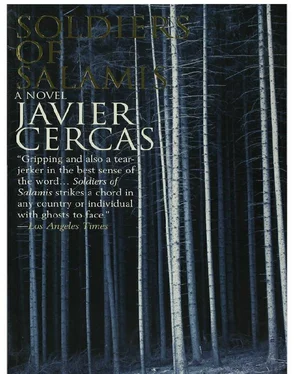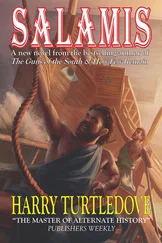'Of all the stories in History,' wrote Jaime Gil, 'the saddest is no doubt Spain's, / because it ends badly.' Does it end badly? We'll never know who that militiaman was who spared Sánchez Mazas' life, nor what passed through his mind when he looked him in the eye; we'll never know what José and Manuel Machado said to each other before the graves of their brother Antonio and their mother. I don't know why, but sometimes I think, if we managed to unveil one of these parallel secrets, we might perhaps also touch on a much more essential secret.
I was very pleased with the article. When it was published, on 22 February 1999, exactly sixty years after Machado's death in Collioure, exactly sixty years and twenty-two days after Sánchez Mazas faced the firing squad at Collell (although the exact date of the execution I only learned later), my colleagues at the paper congratulated me. I received three letters over the following days; to my surpriseI've never been a polemical columnist, one of those names that abound in the letters to the editor, and there was nothing to suggest that events of sixty years ago could upset anyone very much — all three referred to the article. The first, which I imagined was written by a university student from the literature department, reproached me for having insinuated (something I don't think I did, or at least not entirely) in my article that, had Antonio Machado been in rebel Burgos in July of 1936, he would have taken Franco's side. The second was worse; it was written by a man old enough to have lived through the war. He accused me of 'revisionism' in unmistakable jargon, because the question in the last paragraph following the quote from Jaime Gil (Does it end badly?) suggested in a barely veiled way that Spain's story ends well, which in his judgement is completely false. 'It ends well for those who won the war,' he said. 'But badly for those of us who lost it. No one has ever even bothered to thank us for fighting for liberty. There is a monument to the war dead in every town in Spain. How many have you seen with, at the very least, the names of the fallen from both sides?' The letter finished: 'And damn the Transition! Sincerely, Mateu Recasens.'
The third letter was the most interesting. It was signed by someone called Miquel Aguirre. Aguirre was a historian and, according to what he said, had spent several years investigating what happened during the Civil War in the Banyoles region. Among other things, his letter gave details of a fact which at that moment struck me as astonishing: Sánchez Mazas hadn't been the only survivor of the Collell execution; a man named Jesus Pascual Aguilar also escaped with his life. Even more: it seemed Pascual had recounted the episode in a book called I Was Murdered by the Reds. 'I'm afraid this book is virtually unobtainable,' concluded the letter with the unmistakable petulance of the erudite. 'But if you are interested, I can place a copy at your disposal.' At the bottom of the letter Aguirre had put his address and a phone number.
I phoned the number immediately. After a few misunderstandings, from which I deduced that he worked for some sort of company or public institution, I managed to speak to Aguirre. I asked if he had information about the execution at Collell; he said yes. I asked if he was still willing to lend me Pascual's book; he said yes. I then asked if he'd like to meet for lunch; he said he lived in Banyoles, but came to Gerona every Thursday to record a radio programme.
'We could meet next Thursday,' he said.
It was Friday and, at the thought of a week's impatience, I was about to suggest we meet that very afternoon, in Banyoles.
'Okay,' I said, nevertheless. And at that moment I thought of Ferlosio with his innocent guru air and fiercely cheerful eyes, talking about his father on the terrace at the Bistrot. I asked: 'Shall we meet at the Bistrot?'
The Bistrot is a bar in the old part of the city, with a vaguely modernist feel to it, marble and wrought-iron tables, rotary fans, its balconies brimming with flowers and overlooking the flight of steps leading up to the Sant Domenech Plaza. On Thursday, long before the time I'd agreed with Aguirre, I was seated at a table in the Bistrot with a beer in my hand; around me bubbled the conversations of the professors from the literature department who usually ate there. As I flipped through a magazine I thought how, making the lunch arrangements, it hadn't occurred to either Aguirre or I, since we'd never met, that one of us should have mentioned some way of recognizing each other, and I was just starting to try to imagine what Aguirre might look like, solely from the voice I'd heard over the phone a week before, when a short, stocky, dark-haired individual wearing glasses stopped in front of my table with a red folder under his arm, his face barely visible under three-days' growth of stubble and a bad-guy goatee. For some reason I'd expected Aguirre to be a calm, professorial old man, not this extremely young individual standing before me with a hung-over (or perhaps just eccentric) look to him. Since he didn't say anything, I asked him if he were him. He said yes. Then he asked me if I were me. I said yes. We laughed. When the waitress came, Aguirre ordered rice á la cazuela and an entrec ô te au roquefort ; I ordered the rabbit and a salad. While we waited for the food Aguirre told me he'd recognized me from a photo on the back of one of my books, which he'd read a while ago. Recovering from the initial spasm of vanity, I remarked grudgingly: 'Oh, you were the one, were you?'
'I don't understand.'
I felt obliged to clarify: 'It was a joke.'
I was anxious to get to the point, but, as I didn't want to seem rude or overly interested, I asked him about the radio programme. Aguirre let out a nervous laugh, showing his teeth: white and uneven.
'It's supposed to be a humorous programme, but really it's just crap. I play a fascist police commissioner called Antonio Gargallo who prepares reports about the people he interrogates. The truth is I think I'm falling in love with him. Naturally, they know nothing about any of this at the Town Hall.'
'You work at Banyoles Town Hall?'
Aguirre nodded, looking half embarrassed and half sorrowful.
'Secretary to the mayor,' he said. 'More crap. The mayor's an old friend, he asked and I didn't know how to say no. But when this term finishes, I'm quitting.'
Since fairly recently, the municipal government of Banyoles had been in the hands of a team of very young members of the Catalan Republican Left, the radical nationalist party. Aguirre said:
'I don't know what you think, sir, but to me a civilized country is one where people don't have to waste their time on politics.'
I noticed the 'sir', but didn't let it bother me, and instead leapt to grasp the rope Aguirre had just thrown me, catching it in mid air: 'Just the opposite of what happened in '36.'
'Exactly.'
They brought the salad and the rice. Aguirre pointed at the red folder. 'I photocopied the Pascual book for you.'
'Do you know very much about what happened at Collell?'
'Not very much, no,' he said. 'It was a confusing episode.'
As he shovelled big forkfuls of rice into his mouth and washed them down with glasses of red wine, Aguirre told me, as if he felt he must put me in the picture, about the early days of the war in the region of Banyoles: the predictable failure of the coup d'état, the resulting revolution, the unconstrained savagery of the committees, the widespread burning of churches and massacres of the clergy.
'Even though it's not in style any more, I'm still anticlerical — but that was collective madness,' he added. 'Of course, it's easy to find explanations for it, but it's also easy to find explanations for Nazism. Some nationalist historians insinuate that the ones who burned down churches and killed priests were from elsewhere — immigrants and suchlike. It's a lie: they were from here, and three years later more than one of them cheered the arrival of Franco's troops. Of course, if you ask, nobody was there when they torched the churches. But that's another story. What pisses me off are those nationalists who still go around trying to sell the nonsense that it was a war between Castilians and Catalans, a movie with good guys and bad guys.'
Читать дальше












